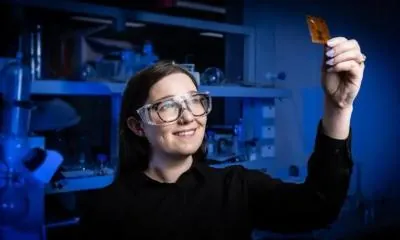
Revolutionizing Cancer Treatment: The Promise of Wearable Organic X-Ray Sensors
2024-11-26
Author: Siti
Every day, over 400 Australians receive a cancer diagnosis, and nearly half of these individuals undergo radiotherapy as part of their treatment. While this method aims to dispose of cancerous cells, its side effects can be severe and significantly impact patients’ quality of life.
Dr. Jessie Posar, leading a research team at the University of Wollongong (UOW), is at the forefront of an exciting development in cancer care: organic x-ray sensors that could potentially reshape the landscape of radiotherapy. In a recent publication in Advanced Functional Materials, Dr. Posar and her team detailed the innovative capabilities of these sensors.
"Radiotherapy's goal is to accurately deliver ionizing radiation to target and destroy cancer cells while sparing surrounding healthy tissues," Dr. Posar explained. She emphasized that the need for precision in treatment is critical, particularly as acute skin toxicity can affect an alarming 70-100% of breast cancer patients. Clearly, improving the safe application of radiation could lead to better health outcomes for patients across Australia.
The research highlights the unique advantages of organic semiconductors, which are lightweight, cost-effective, and biocompatible, making them superb candidates for wearable x-ray detection. Unlike traditional silicon-based detectors, organic sensors can provide real-time monitoring of a patient’s radiation exposure, allowing for immediate adjustments during treatment to cushion healthy tissues from unnecessary harm.
Investigations into the performance and stability of these organic sensors were conducted under clinical conditions, producing promising results. "We demonstrated that these sensors could detect x-rays without being affected by the energy or dose-rate of the incoming beam at our testing facility," Dr. Posar stated. Remarkably, they allowed 99.8% of the treatment beam to pass through unimpeded—an improvement that could significantly enhance patient safety during oncological procedures.
In collaboration with the Australian Nuclear Science and Technology Organisation's (ANSTO) Australian Synchrotron, the research taps into cutting-edge techniques such as Microbeam Radiation Therapy, a method developed to target otherwise inoperable tumors, including those located in the brain. Dr. Posar noted the pressing need for a detector capable of ensuring quality assurance in this new treatment modality.
"Our study revealed that our organic sensors can measure microbeam x-rays with an exceptional precision of 2%," she added, pointing out their comparable radiation tolerance to established silicon-based detectors. This breakthrough not only reflects the potential for safe, long-term patient monitoring but also paves the way for personalized radiation therapies that maximize treatment effectiveness while reducing adverse effects.
As the research progresses, data science will play a critical role in accelerating the transition from laboratory discoveries to practical applications. Dr. Posar emphasized the importance of global collaboration for these advancements, highlighting a network that includes renown institutions in Australia and across Europe.
Professor Marco Petasecca, who oversees the collaboration efforts, affirmed that their team has a solid track record of working with top researchers worldwide in the organic sensor field. The partnership includes notable figures from institutions such as the University of Surrey and the University of Bologna, demonstrating an international commitment to enhancing the capabilities of organic sensors.
Professor Attila Mozer contributed to the discourse, sharing insights on the evolving performance of organic materials over the past two decades. The transformative journey of integrating these materials into radiation detection challenges long-held beliefs and has been a rich learning experience for all involved.
UOW PhD candidate Aishah Bashiri is also integral to the research, focusing her studies on developing novel radiation detectors for advanced radiotherapy techniques. Her work, overseen by Dr. Posar and others, is set to make waves in how we understand and apply radiotherapy in the future.
With innovations in organic x-ray sensors, the future of cancer treatment could be not just safer but also more effective, providing hope to countless patients battling this devastating disease. Stay tuned for what's next in this remarkable journey towards personalized radiation therapy!


 Brasil (PT)
Brasil (PT)
 Canada (EN)
Canada (EN)
 Chile (ES)
Chile (ES)
 España (ES)
España (ES)
 France (FR)
France (FR)
 Hong Kong (EN)
Hong Kong (EN)
 Italia (IT)
Italia (IT)
 日本 (JA)
日本 (JA)
 Magyarország (HU)
Magyarország (HU)
 Norge (NO)
Norge (NO)
 Polska (PL)
Polska (PL)
 Schweiz (DE)
Schweiz (DE)
 Singapore (EN)
Singapore (EN)
 Sverige (SV)
Sverige (SV)
 Suomi (FI)
Suomi (FI)
 Türkiye (TR)
Türkiye (TR)